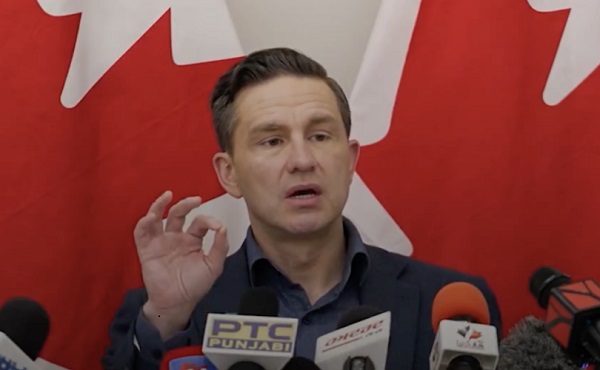Media
Poilievre vows to end mainstream media’s stronghold over Parliamentary Press Gallery

From LifeSiteNews
‘There is no reason why it should be a small cabal of government-approved mouthpieces.’
Canada’s Conservative Party leader Pierre Poilievre has promised to end the mainstream media’s stronghold over the Parliamentary Press Gallery, calling the current system “highly undemocratic” in which only a “small cabal of government-approved mouthpieces” are permitted membership.
“There is no reason why it should be a small cabal of government-approved mouthpieces,” Poilievre said in an interview with Juno News, calling the current system “highly undemocratic” and vowing to allow “independent media” in the “precinct.”
Poilievre remarked that the current situation in the press gallery has made it “particularly difficult for me because it means when I go and hold a press conference it’s just liberal media who are there to attend,” implying that the system itself contributes to political bias in news coverage.
Poilievre noted that he would “love to see a scenario where every different kind of journalist from all backgrounds, of all opinions, is given a chance to report on what happens on the Hill.”
As it stands now, to gain accreditation to the press gallery, a news outlet must be approved by an executive committee in secret. The reality is that 5 out of the 9 current executive committee members work for the state-funded Canadian Broadcasting Corporation (CBC) and the Canadian Press.
When looking further, a whopping 39 out of 46 media companies with press gallery accreditation get federal money via grants or subsidies.
Earlier this year, Prime Minister Justin Trudeau’s Liberal government pledged to increase the CBC’s funding to some $2 billion annually.
Poilievre many times before has said he will defund the CBC should his Conservative Party form government.
Media
CBC retracts false claims about residential schools after accusing Rebel News of ‘misinformation’

From LifeSiteNews
CBC has issued a correction after falsely accused Rebel News of spreading misinformation while itself promoting the false claim that remains of Indigenous children were found in unmarked graves at residential schools.
The Canadian Broadcasting Corporation (CBC) has issued a correction after blaming Rebel News of “misinformation” while spreading false information itself.
On April 17, CBC corrected a comment from chief political correspondent Rosemary Barton who accused Rebel News reporter Drea Humphrey of spreading “misinformation,” while repeating the false claim that bodies have been found in unmarked graves at Indigenous residential schools.
“Yes, there have been remains of Indigenous children found in various places across the country,” Barton falsely stated during a live broadcast following the French-language federal election leaders’ debate.
Her comment was in reference to New Democratic Leader (NDP) Jagmeet Singh refusing to answer a reporter’s question whether he would condemn the rash of church burnings and acts of vandalism across Canada.
“In this case you saw Mr. Singh, and this has been his position for some time, to refuse to answer questions,” Barton said during the live stream.
“Rebel News in particular traffics in misinformation, lack of facts, and as you heard in that question, which was woven with some truth and some things that weren’t true,” she claimed.
“Yes, there have been burnings of Christian, Catholic churches,” she admitted.
“Yes, there have been remains of Indigenous children found in various places around the country, which she misrepresented,” Barton falsely stated.
Despite mass excavations, there have still been no mass graves discovered at any residential schools across Canada, but politicians and media continue to promote the false narrative.
CBC was quickly called out for their false statement, which ironically came at the same time as accusing another media outlet of spreading “misinformation.”
However, even in their correction statement, CBC failed to mention that, to date, no human remains have been discovered.
“As CBC News has reported on multiple occasions, what several Indigenous communities across Canada have discovered on the sites of some former residential schools are potential burial sites or unmarked graves,” the statement read.
However, CBC is now well known for pushing the false narrative that hundreds of children were buried and disregarded by Catholic priests and nuns who ran some of the schools. As a consequence of that false narrative, since 2021, over 100 churches have been burned or vandalized across Canada in seeming retribution.
Indeed, in addition to perpetuating the “mass graves” narrative, media and politicians have even threatened to punish those who oppose it. In October 2024, CBC ran a story which suggested that “residential school denialism” should be criminalized.
John Stossel
Climate Change Myths Part 1: Polar Bears, Arctic Ice, and Food Shortages

From StosselTV
Climate zealots tell us the end is near. It’s the era of “global BOILING!” says the UN Secretary General. Climate alarmists say the Arctic will soon be ice-free and cities will be underwater! But what do the facts say?
The facts say that the climate change fanatics’ catastrophic claims are wrong.
In this video and the next, we’ll debunk 7 myths about climate change.
First up: melting ice, polar bear extinction, and climate change famines.
Here are the sources for this video:
No new record low summer ice extent observed since 2012. https://agupubs.onlinelibrary.wiley.c…
Satellite data show average annual sea ice volume largely stable since 2010: https://psc.apl.uw.edu/wordpress/wp-c…
Total arctic ice mass: http://psc.apl.uw.edu/research/projec…
Polar Bear Estimates 1993-today: https://www.iucn-pbsg.org/wp-content/…
1981: https://portals.iucn.org/library/site…
1960s: https://www.google.com/books/edition/…
Global agricultural output: https://ourworldindata.org/grapher/ag…
NASA Greening study: https://www.nasa.gov/centers-and-faci…
Malnutrition deaths: https://ourworldindata.org/grapher/ma…
Coffee production: https://www.fao.org/faostat/en/#compare
After 40+ years of reporting, I now understand the importance of limited government and personal freedom. ”
——————————————
Libertarian journalist John Stossel created Stossel TV to explain liberty and free markets to young people.
Prior to Stossel TV he hosted a show on Fox Business and co-anchored ABC’s primetime newsmagazine show, 20/20.
Stossel’s economic programs have been adapted into teaching kits by a non-profit organization, “Stossel in the Classroom.” High school teachers in American public schools now use the videos to help educate their students on economics and economic freedom. They are seen by more than 12 million students every year.
Stossel has received 19 Emmy Awards and has been honored five times for excellence in consumer reporting by the National Press Club. Other honors include the George Polk Award for Outstanding Local Reporting and the George Foster Peabody Award.
_ _ _ _ _ _
In order not to miss the next video from Stossel TV, sign up here: https://johnstossel.activehosted.com/f/1
_ _ _ _ _ _
-

 International2 days ago
International2 days agoPope Francis has died aged 88
-

 International2 days ago
International2 days agoJD Vance was one of the last people to meet Pope Francis
-

 2025 Federal Election1 day ago
2025 Federal Election1 day agoOttawa Confirms China interfering with 2025 federal election: Beijing Seeks to Block Joe Tay’s Election
-

 COVID-191 day ago
COVID-191 day agoNearly Half of “COVID-19 Deaths” Were Not Due to COVID-19 – Scientific Reports Journal
-

 2025 Federal Election1 day ago
2025 Federal Election1 day agoHow Canada’s Mainstream Media Lost the Public Trust
-

 Business2 days ago
Business2 days agoCanada Urgently Needs A Watchdog For Government Waste
-

 2025 Federal Election15 hours ago
2025 Federal Election15 hours agoBREAKING: THE FEDERAL BRIEF THAT SHOULD SINK CARNEY
-

 International2 days ago
International2 days agoPope Francis Dies on Day after Easter






